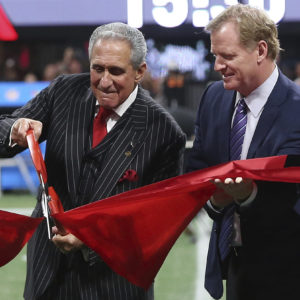Vice President Mike Pence was the latest official to become ensnared in the National Football League kneeling saga, after leaving the Indianapolis Colts-San Francisco 49ers football game in response to the “unpatriotic” gestures of players.
As outraged sentiments fling back and forth, talking heads and elected officials continue to nitpick while ignoring far larger issues. At a time when NFL minutiae is bound to be endlessly scrutinized and politicized, taxpayers are footing an enormous bill toward NFL teams. These subsidies, which originate at the local, state and federal levels, denigrate the game and give politicians carte blanche to insert themselves in league actions.
In fact, the stadium that Pence left, taxpayers ponied up an astounding $619.6 million of the stadium’s $719.6 million construction price — or $730 for every man, woman and child in Indianapolis. Taxpayers’ massive investment in building a stadium for a billionaire team owner proved disastrous for the Indianapolis economy. Since the construction of the stadium, the poverty rate in Marion County, the county in which Indianapolis is located, skyrocketed from 12.7 percent to 21.3 percent and the median household income dropped more than $10,000, from $51,553 to $41,478.
According to a 2015 report by the Taxpayers Protection Alliance, state and local government subsidies to the National Football League totaled nearly $7 billion over the last 20 years. State and local officials claimed that these stadiums would be the economic golden goose to rev up their economy.
TPA’s report compared median household income and poverty rates in counties with NFL stadiums before and after tax dollars were used to subsidize the stadiums. In 60 percent of the cases, median household income decreased and poverty rates increased. In only 20 percent of the cases did household income increase and poverty rates decrease. That golden goose was more of a turkey.
Scholars at the Brookings Institution pinned the federal contribution (through tax-exempt municipal bonds) at $1.1 billion since 2000. Defenders of continued subsidies chant a predictable mantra of “jobs, jobs, jobs.” Local government officials, manned by an army of consultants, produce optimistic figures about the economic “stimulus” effects of these new stadiums, without consideration of any unintended consequences.
And, as TPA investigative reporter Johnny Kampis documented in his four-part series on the Raiders’ coming move from Oakland to Las Vegas, there are many unseen costs.
To accommodate patrons, new NFL host cities typically need to foot the bill for costly new infrastructure endeavors. The Las Vegas Monorail, which will need to be expanded to ease game day parking woes, has regularly incurred operating losses in the hundreds of millions of dollars since coming online in 2004. And, at an initial capital cost of $150 million per mile, any expansion is likely to fleece taxpayers and existing Monorail consumers.
But the unanticipated costs don’t end at infrastructure. Movie theaters, for example, garner a substantial part of revenue from Sunday showings, putting them in direct competition with the NFL. Ditching the silver screen for the Silver and Black just shifts income from lowly paid movie theater employees to hypothetical (also low-paid) stadium employees. And due to the low number of NFL games per season, stadium employment isn’t nearly as dependable as movie theater opportunities.
Any serious economic analysis of an NFL relocation ought to take this into account, and estimate how many jobs will be hemorrhaged in alternative forms of entertainment. Other unintended consequences are even less well-known, but just as devastating.
David Kalist and Daniel Lee of Shippensburg University in Pennsylvania have found that NFL home games are associated with a 2.6 percent increase in crime in the host city, costing the city around $86,000 in extra funds. The jail inside the Lincoln Financial Field in Philadelphia shows just how unruly fans can get.
Even the Department of Defense has gotten in on the action, shelling out millions of dollars over the past decade to incentivize patriotic showmanship at the beginning of games. But the brouhaha over anthem kneeling demonstrated that even the most carefully orchestrated patriotic ceremonies can backfire and cause endless headaches for everyone involved. These unintended consequences are emblematic of the subsidy machine as a whole, and should prompt policymakers to reverse course. Phasing out subsidies would lift a heavy burden off taxpayers, while removing politics from America’s beloved game.
Lawmakers at all levels of government need to take all costs into account, when stimulating stadium building and team relocation.
The recent tumult over anthem kneeling should show officials that injecting politics into sports sows chaos and rarely achieves the desired result. By ending the tax exemption on municipal bond financing and the Defense Department subsidization of patriotic acts at games, the federal government can send a strong message that the taxpayer gravy train has come to an end.
Continued subsidies will only keep the NFL in the sewer, at a high cost to citizens across America.

